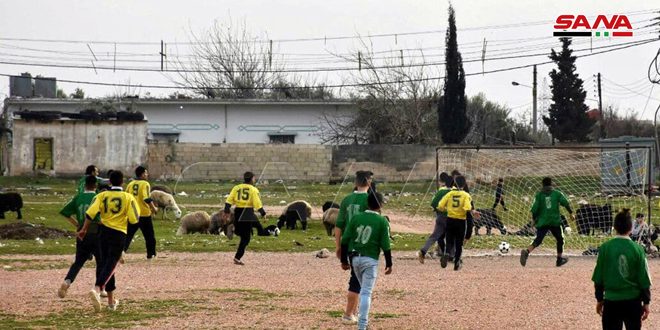Homs, (ST) -The pain and bitterness that they suffered from while living in camps due to the forced displacement caused by terrorism has completely dissipated the moment they returned to their homeland, to their homes, alleys, lanes, and the smell of dirt. They tell tales of long-suffering about the crimes of terrorism and the pain of forced displacement from their homes, cities and villages, while they return today to their neighborhoods in Deir Baalba in Homs, feeling safe and reassured.
Ahmed Abdel-Razzaq Suleiman, one of the neighborhood’s residents who returned after years of displacement in Lebanon, says to SANA, “We lived with our neighbors in the Zahra and Hazmieh neighborhoods for many years in peace and security…Terrorism forced us to leave our homes. At the beginning of the war, we were deported to Lebanon, where we were subjected to inhuman treatment… We were subjected to harassment and they deprived our children of education. “

“We decided to return to our homes after liberating the region from terrorism … It was a great joy for my children when they went to school that is a few meters away from our home. A person is nothing but a country … the homeland is support,” he added in a voice that reflects a reassurance that he has missed for years.
The story of Ahmed Abdul Razzaq is one of many stories that summarize the bitter years of obligatory displacement imposed by terrorism on many Syrian families who were enforced to leave their homes as it truthfully reflects the story of return to life and hope in the homeland.
Ghazieh Al-Nasser, the elderly woman, sat in front of her door, enjoying the warmth of the sun after rainy days, watching the green areas and the noise of life in all its details, her gaze accompanied by the movement of sheep in front of her and the noise of the youths playing football in a wide yard separating the houses.
“Praise be to God … May God help all the displaced to return to the homeland … Nothing is dearer or more beautiful than the homeland … Syria is our mother … May God preserve it. When we deserted our homes, I cried a lot… We were born here and we lived here … God protect you Mr. President, thanks to you and by the grace of God, we returned, and Syria is safe,” she said in a simple accent.
Speaking about safety and hope in his neighborhood away from the displacement camps, Khaled Al-Hussein says “We cannot compare life in the camps with life in our homes in the homeland,” affirming “Those who die in their homeland die free and honest. In Al-Rukban camp, people died in a humiliating way. Today in our homes, we enjoy the blessings of security and safety”.

The mayor of Deir Baalba neighborhood, Safwan al-Najeeb says, that the neighborhood has been subjected to terrorism and its residents have been abandoned by terrorist organizations since 2012. Today, the people have returned to their homes thanks to the sacrifices of the Syrian Arab Army. Normal life has returned to the district in parallel with providing people with basic services and living necessities in cooperation with all the civil and official authorities by providing subsidies and repairing homes, referring to the gradual return of the population, especially from Lebanon, the Rukban camp, and the various regions.
Al-Najeeb added, “Whoever sees the wheat cultivated in the Deir Baalba neighborhood today realizes that it is building a bright future for its children and promises a renewed Syria. The stories of displacement and the cruelty of life imposed by the conditions of war on Syria were not easy at all, but Syrians today are more proud and proud as they returned to their homes and their jobs”.
Deir Baalba district is one of the largest neighborhoods in Homs in terms of area and population. It is located in the northeastern side of the city on the Salamiyah road. It has extensive agricultural lands that were liberated from the terrorist organizations by the Syrian Arab Army in 2012.
Amal Farhat

